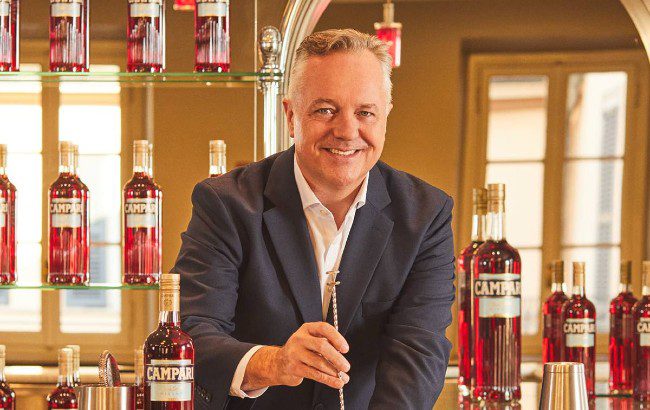Campari Group CEO: premiumisation not on hold, but selective
Simon Hunt, Campari Group CEO, speaks about navigating a landscape where “every single market” is facing challenging conditions, and the US$90 million impact of US tariffs on the business.

“For the first time you’ve got every single market having a tough time at the same time,” Campari Group’s CEO, Simon Hunt, told The Spirits Business after the company’s half-year results for 2025. “China’s down, Russia’s struggling, and the US has been tough. But against that back drop, we’ve actually got a really nice growth story, and had a very good Q2.”
However, thanks to a 4.2% fall in Q1, organic growth was just 0.1% for the period, though gross profit was up by 0.9%. “For me it always comes down to brand performance, and what we’ve shown in our sell-out performance is that we continue to outperform our peers in pretty much all the markets we compete in,” Hunt claimed.
The fact Easter came late this year benefitted the Q2 results, particularly in terms of the aperitivo market and Campari’s biggest brand, Aperol, which accounts for almost a quarter of the group’s net sales. “Our on-premise business is going well,” he said. “In the UK we’ve seen some really good growth of 14%.”
Yet discussing global trading conditions with his board, “all of us agreed it’s probably one of the trickiest markets we’ve seen in our collective experience,” he said. “The downturn is a downturn, but it’ll come back. It’s down to the economic pressure on consumers which is forcing them to make choices.”
Asked if premiumisation is over, or at least on hold in the current climate, he replied: “I don’t think it’s on hold. I think it’s selective. I think where consumers see real value, they’ll continue to trade up. Take the US and Espolòn Reposado, where we’re talking of an 11% performance. That’s a US$30 a bottle Tequila, so you’re still seeing a trade up.”
But he conceded other consumers will be trading down from more expensive bottles of Tequila. “So, it’s all about where consumers are coming from, and then making sure there’s the right balance between our price, the value they see in our brands and the quality of the liquid.”
US tariffs could cost US$90m annually
The day after the results, US tariffs of 15% on the EU came into force on 1 August. “Twenty-eight percent of our sales are in the US, and within that about 70% of our products are imported, so it does have a material impact for us,” said Hunt. “On an annualised basis, it’s probably US$90-odd million.”
On the possibility of a tariff exemption for spirits, he said: “There are still ongoing conversations. Certainly, spirits companies on both sides of the Atlantic want zero-for-zero [tariffs]. It’s in everyone’s interest in what is a tough market at the moment. But that’s not our decision, that’s up to the White House and the EU. So far, what we’ve learnt is to speculate on tariffs after Trump’s ‘Liberation Day’ is a fool’s game because every week it changes.”
‘We are not doing any M&A’
He refused to comment on whether the EU might impose retaliatory tariffs on Bourbon. In Campari’s results presentation “a soft trend for Wild Turkey in its core United States market,” was blamed for the brand’s 8.1% fall. This was despite a 7.5% rise in Asia Pacific where Wild Turkey RTDs are popular in Australia, South Korea and Japan. Growing the group’s share of a region that accounts for just 6% of its sales remains a key priority.
In the US: “I don’t think there’s a lot of pricing movements at the moment because the devalued dollar means that actually whatever tariffs come through are then getting an additional hit when it gets to shelf,” he told Reuters. The Euro is up by more than 10% against the dollar so far this year.
Prior to joining Campari Group last September, Hunt was CEO of William Grant & Sons, while Thomas Moradpour, Campari Group’s new head of brands and strategy, was running Glenmorangie. Despite all that Scotch whisky experience, the category accounts for less than 1% of the group’s sales with the single brand of Glen Grant.
Asked about acquisitions, he said: “Scotch is a fantastic category. I’m passionate about it, so if there were good opportunities further down the line… potentially. But for now, we’ve said we are not doing any M&A [mergers and acquisitions]. We’re going to focus on de-leveraging and making sure we get our debt position down.”
Related news
Campari Group navigates tariffs with 2025 sales rise
